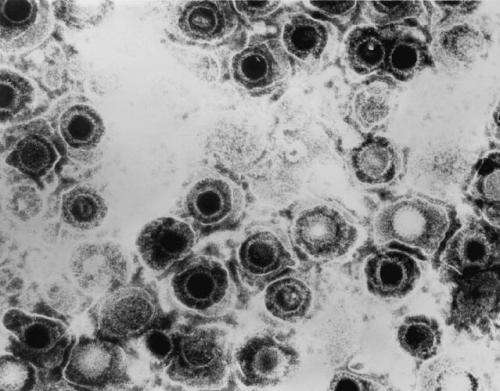Scientists describe new herpes treatment strategy

Scientists have developed a novel treatment approach for persistent viral infections such as herpes.
Using animal models of herpes simplex virus (HSV) infection, researchers show that blocking the activity of a host cell protein called LSD1 reduces HSV infection, shedding (release of viral particles) and recurrence. LSD1, which is essential for HSV's infectious cycle, modifies certain host proteins that control access to DNA. These modifications, known as "epigenetic" changes, help determine how and when genes are used. The collaborative effort, led by scientists at the National Institute of Allergy and Infectious Diseases (NIAID), part of the National Institutes of Health, demonstrates the potential of epigenetic therapy as an antiviral strategy.
After initial infection, HSV enters a latent state in sensory nerve cells, periodically reactivating to produce disease. HSV typically causes recurrent oral or genital lesions and can contribute to the eye disease herpetic keratitis, a leading cause of blindness. Even without symptoms, HSV-infected people can shed and transmit the virus. Current HSV treatments, which target viral proteins, do not effectively control shedding or reactivation of latent virus.
The investigators used an existing drug, tranylcypromine, to block LSD1 activity in three different animal models of HSV infection and disease. The treatment targets a very early stage of the HSV infectious cycle and greatly reduced symptoms of HSV disease, shedding and lesion recurrence. By blocking a cellular rather than viral component, the treatment may minimize the evolution of drug-resistant viruses.
The results also indicate that even during latency, HSV's genetic material is subject to epigenetic changes that can be regulated with drugs. Epigenetic therapies are rapidly being developed as cancer treatments, opening the possibility to also test these drugs for antiviral activity.
More information: JM Hill et al. Inhibition of LSD1 reduces herpesvirus infection, shedding, and recurrence by promoting epigenetic suppression of viral genomes. Science Translational Medicine, DOI: 10.1126/scitranslmed.3010643 (2014).


















